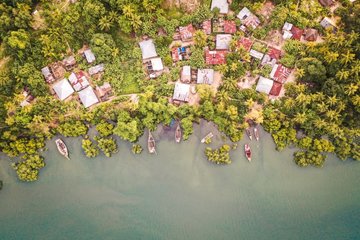The cautious path to a stable state
The violent conflict in Afghanistan has been escalating since 2005, making the process of reconstruction that much harder. To bring stability to the country, the focus must be on strengthening the state and facilitating the rule of law.
by Tilmann J. Röder; in: MaxPlanckResearch 2/09

One afternoon in 1998, Fahim, who would later become our driver, was walking through the district of Khair Khana in Kabul. The streets were quiet, almost empty. Under the Taliban, the people had withdrawn further and further into their own private lives. Every step outside could lead to trouble. Adherents of the Islamist regime confiscated cars in which music could be heard playing – such modern forms of entertainment were banned. They seized men whose beards did not seem to them to be long enough. Children were forbidden to fly kites. But women suffered the most. A bit of nail polish or a hint of perfume from beneath the burqa could arouse suspicions of prostitution and put them at risk of their lives. Many sank into poverty as the Taliban forbade them to take up any paid employment.
The inhabitants felt themselves oppressed and, not infrequently, were subjected to unrestrained random violence
That was the day on which Fahim’s life changed abruptly. He saw something he had often seen before: a Taliban cursing and beating a woman in broad daylight. Fahim walked past – then turned around. In contrast to normal procedure, the Taliban was alone. No one else was in sight. Even as Fahim struck the blow, so he has told me, he knew that he would have to leave Kabul. In a city of only a few hundred thousand inhabitants, the risk of another encounter with the bully from whose clutches he had rescued the woman was too great. He remained in Iran until the Islamists fell from power.
Fahim’s fate says something about the relationship between rulers and the ruled at that time. The Taliban did not govern in accordance with generally accepted rules. The Shari’a may have prevailed as their supreme law, but their radical fundamentalist interpretation of it had little in common with Afghanistan’s liberal Islamic tradition. Even these rules were not applied uniformly by the Taliban, but were enforced by each individual as he saw fit. The inhabitants felt themselves permanently oppressed and, as in the case of the woman rescued by Fahim, were not infrequently subject to unrestrained random violence.
There were no instances of self-regulation anchored in law within the ruling order, no judges to control the exercise of state power. If he was to help the woman, Fahim had no other choice than to intervene himself. Afterwards, it would not have been sensible to remain in the country. In reality, many Afghans had welcomed the Taliban with relief in 1996; after years of civil war, they promised a return to tranquility. People at that time had no idea just what an impact their fundamentalist interpretation of Shari’a would have on life.
What happened to the country after September 11, 2001 is well known: The US government drove out the Taliban, whom they had once supported, with the aid of the same warlords who, in the mid-1990s, had devastated the country. This transfer of power was also welcomed by the population – but once again, their hopes for a swift and sweeping improvement in their living conditions were dashed.
To this day, half the population of Afghanistan is still living below the poverty line
To this day, half the population is still living below the poverty line. The majority of people have no access to clean water and electricity. The crime rate has soared. A current study by the Asia Foundation quantifies the pessimistic mood in stark figures: only 38 percent of those interviewed believe the country is headed in the right direction; 32 percent think the opposite, and the rest are undecided. In the space of two years, the percentage of those who consider themselves better off now than in the Taliban era fell from 54 to 36 percent. Afghans consider the biggest problems to be the security situation (36 percent), followed by unemployment (31), high prices (22), the weakness of the economy (17) and corruption (14).
Of course, some positive developments are also evident. For example, six million children now go to school – five times as many as in 2001; and yet, that is still only half the number of children of school age. There has also been a sharp decline in infant mortality – though this can hardly be described as progress, given that one child in six still does not live past the age of five. Despite a substantial improvement in basic medical care, the average life expectancy is just 44 years. The small steps forward depicted in these abstract figures and statistics are insufficient to constitute a fundamental turnaround.
What help does Afghanistan need in this situation? What role can scientists play? The Max Planck Institute for Comparative Public Law and International Law in Heidelberg has been monitoring the reconstruction of the Afghan system of government and law for some years now, and has been actively supporting the process since 2003 with advice and educational projects. The urgently needed change in military strategy cannot be a prime focus for the scientists’ work, and yet the continuing problems engendered by military intervention raise issues they must confront. It is clear that the conflict with the Taliban and other forces hostile to the government cannot be won by force of arms. The question is, why has so little thus far been achieved in rebuilding the lives of the civilian population? What must happen for there to be a noticeable improvement?
Naturally, improvements would be welcome in every area that affects the lives and welfare of every individual. On the other hand, consideration must also be given to which objectives are actually achievable in the present situation. It is not just a question of what to do, but of how outside assistance can be implemented.
The essential basis for any development is security. Where violence rules, it is impossible to provide anything other than emergency aid – help to prevent people from starving or freezing to death and, wherever possible, basic medical care. Longer-term action, such as the construction of highways, schools and courts, make little sense when the roads cannot be traveled for fear of being attacked, schools are being burned down and judges murdered. All of these things continue to happen, mainly in Afghanistan’s southern and eastern provinces.
As soon as and to the extent that the security situation becomes adequately stable, the state must be enabled to exercise “effective territorial control” in the sense of a legitimate monopoly on the use of force, and provide further services for its citizens. That may sound self-evident, but the behavior of foreign agencies – whether government institutions or private aid organizations – clearly demonstrates that many of them feel no more than a conditional commitment, if any at all, to this goal. Until 2004, the allied forces continued to bolster the power of the warlords with a great deal of money and weapons because they felt unable to control the country without a decentralized network fighting on their side. In the process, large parts of the population had their faith in a new beginning shattered.
In the meantime, no one gets past these warring parties who control both political events and the drug trade. For better or worse, even German army unit commanders have to sit down at the table with them to negotiate matters of security and reconstruction in “their” provinces. The effectiveness of the government in Kabul is also hampered by the fact that countless foreign agencies have developed their own structures for the provision of services.
Many of the traditional tasks of the state – establishing economic stability, guaranteeing a minimum of social security, public health care, education, combating the cultivation of drugs – have also been assumed by them. This is welcome insofar as it improves the actual living conditions of the recipients of their services, but it is also dubious insofar as the Afghan state is unable to develop in its own right. The money that foreign agencies spend is not available to Afghan institutions. What is more, in many cases they act without even informing their Afghan partners. In effect, they are largely paying lip service to the highly vaunted aim of “Afghan ownership.”
The sovereignty and traditions of the country must be respected
If Afghanistan is to benefit from sustained stabilization and development, then the state must take center stage and not be subverted. There are two essential elements that should be at the core of any new strategy: transferring the duties of the state into the hands of Afghan institutions, and providing intensive support for the rule of law, while ensuring that the sovereignty and specific traditions of Afghanistan are respected.
From a fiscal perspective, the most important factor in bolstering reconstruction by Afghan institutions acting on their own authority and responsibility is the availability of an adequate state budget. Since the Afghan state has only a negligible income of its own – likely to be around 887 million dollars in the current fiscal year – the country is dependent on external financial aid. This contribution to the state budget is estimated to total 6.5 billion dollars. Nevertheless, it is not hard to understand the criticism voiced by Afghan politicians who point out that, of the roughly 25 billion dollars promised since 2002, only around 15 billion have been released to date.
There is also the fact that a large part of these funds can be dispensed only through the medium of projects implemented by donor country agencies. As a result, around 40 percent of all funds are effectively repatriated in the form of salaries and company profits. This is not necessarily to be condemned, but it must be borne in mind in estimating the actual extent of foreign support for Afghanistan. Further funding is tied exclusively to specific projects. Thus, ultimately, the Afghan government has free access to only a very small part of the imposing sum quoted above. This money, for instance, is not enough to pay government employees adequate salaries that they and their families can live on. And from judges and public prosecutors to soldiers and policemen – those earning less than 100 dollars a month are susceptible to corruption and may even cross over, gun in hand, to join the ranks of anti-government groups that pay more money.
Considering the grossly disproportionate ratio between military and civilian spending, it is clear that there is money available to adequately finance the Afghan state. Spending on development aid is running around seven million dollars a day – which, in itself, sounds like an impressive sum. Then again, the international military deployments soak up well over 100 million dollars. One percent of that would suffice to pay Afghanistan’s judges and public prosecutors, soldiers and policemen a proper salary.
In order to provide a stable framework within which to implement the available development strategies, efforts to strengthen the independent authority of the Afghan state must, from a legal perspective, be accompanied by intensive support for the rule of law. It would make sense simply to accept the formal existence of the rule of law as an initial target. That essentially means compelling the administrative system and the courts to observe the law as it stands in order to protect citizens from arbitrary oppression. Reports may no longer be coming in of events such as the attack by a Taliban on a defenseless woman as witnessed by Fahim, but the mistreatment of alleged offenders, unfair trials, judicial corruption and similar abuses are widespread.
Representatives of state institutions who allow themselves to be guided by “higher truths” have a tendency to breach both the constitution and the law
In this context, the Max Planck Institute in Heidelberg is intensively supporting reform by training and educating Afghan judges, public prosecutors and senior police officers. Many of them hold conservative religious beliefs. Above all, it requires lengthy discussion to convince them that the constitution must be respected as the supreme law of the land. However, there have been some clear successes. For example, the widespread refusal to acknowledge basic human rights, which are also anchored in the Afghan constitution, lessens as Afghan jurists come to recognize that most of these rights are compatible with Islamic principles, and that there are pragmatic solutions to be found to many of the remaining instances of conflict. This process of persuasion is tremendously important given that representatives of state institutions who allow themselves to be guided by religious or ideological “higher truths” have a tendency to breach both the constitution and the law.
It is also important to introduce judicial processes by which citizens can assert their legal rights even against the state. Such control mechanisms are almost entirely lacking in Afghanistan. They do not correspond with the traditional hierarchical perception of the relationship between the citizen and the authorities – which does not mean that it would be unrealistic to introduce such mechanisms. However, the rule of law also demands that the judiciary must be independent. Afghanistan is, as yet, far removed from this situation – though the principle at least is enshrined in the constitution. None of these elements fundamentally conflict with the teachings of Islam.
Precipitate reforms have never been conducive to success
Critics of this formal concept of the rule of law rightly point out that a state system of this nature could still be used for purposes of oppression. Afghanistan does indeed have some legal norms that are not compatible with Western interpretations of human rights – Afghan family law, for instance, makes it significantly harder for women to obtain a divorce than men. Proponents of a substantive concept of the rule of law would like to see human rights and basic democratic principles prevail. However, caution is advised. This is where well-meaning advisers run the risk of imposing values on Afghan society that are not welcome. Many people in the country perceive this kind of pressure to be arrogant and dishonest.
Consider, for example, the case of the convert Abdul Rahman, who was baptized while in exile and, two years ago, was prosecuted in Afghanistan for renouncing Islam. With the prospect of the death penalty looming, foreign governments and human rights organizations bombarded the Afghan president with demands to intervene and ensure the man’s release. These were the same governments and organizations that, in a different context, had sworn to uphold the national sovereignty of Afghanistan and demanded that the Afghan government finally safeguard the independence of the judicial system – and that to this day show scant regard for the human rights of Afghan detainees in prison camps such as Guantánamo and Bagram. This exercise in double standards was perceived by many Afghans as blatant cynicism.
Western governments are well advised to stick to their own principles and consider the history of Afghanistan. Precipitate reforms have never been conducive to success. The reformist Shah Amanullah, who introduced coeducation and instituted a ban on headscarves, was no more successful in the 1920s than were the communist leaders of the 1970s and 1980s. In each case, their attempts at reform were followed by long periods of violence and a sharp reversal of modernization.
Many things are better achieved by cautious means. The process of promoting human rights should be centered primarily in civil society, for instance by supporting the program of education undertaken by the Afghan Human Rights Commission, so that the pressure for reform is allowed to build among the population. Members of the Human Rights Commission are regularly invited to take part in Max Planck seminars where they themselves can best explain their role and their activities to judges and public prosecutors and foster an understanding of their concerns.
Thus, in answer to the question of how help for Afghanistan should best be implemented, it is not just the obvious, mainly technical aspects that are important, such as better coordination between aid organizations. From the point of view of the Afghans themselves, honesty and credibility are far more significant. That also includes taking Islam seriously as an inherently peaceful religion and civilization. Those who involve themselves in the Islamic world should not forget that, in the past two hundred years, no Islamic state has ever attacked a Western country. The majority of crimes against humanity that shape our political awareness have been committed by so-called developed countries – a fact that is not forgotten, particularly in countries like Afghanistan.
The Author:
Dr. Tilmann J. Röder has worked at the Max Planck Institute for Comparative Public Law and International Law in Heidelberg since 2006 and is the head of projects in the Middle East and Central Asia. The current regional focus of his work is on Afghanistan and Iraq. Central issues include constitutional law and normative pluralism.












